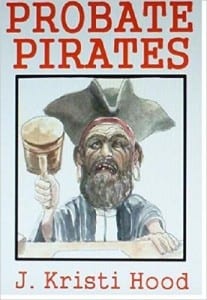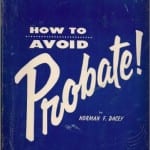Probate Pirates
Probate Pirates
Author: J. Kristi Hood
Reviewed for the NABBW by: Anne Holmes
Is the probate system a protection racket?
 Based on her personal experience, author Hood says yes. Starting with her first chapter, titled “It’s all about the money all of the time,” she warns the reader that the information provided in her book, which is based on her personal experience with her father, is “pugnacious and provoking.” Her goal in writing of her experiences and subsequent research, is to help readers understand “the tar pit our probate counts have become.” Specifically, she says:
Based on her personal experience, author Hood says yes. Starting with her first chapter, titled “It’s all about the money all of the time,” she warns the reader that the information provided in her book, which is based on her personal experience with her father, is “pugnacious and provoking.” Her goal in writing of her experiences and subsequent research, is to help readers understand “the tar pit our probate counts have become.” Specifically, she says:
“The purpose of this book is to pass on some very expensive, hard won information. I hope to reach Baby Boomers and members of the Greatest Generation who might believe that going to probate court to protect yourself is the smart thing to do.
Hood clearly spells out why probate court is not about protecting the elderly, but is instead a machine designed to systematically fleece old people of their money and humanity. Probate piracy, she says, is a not only a growth industry, but a ridiculously easy crime whose perpetrators enjoy an almost zero chance of getting caught. Worse, these crimes are all conducted in probate court and are completely under the radar.
Her goal in writing the book is to show readers how to keep probate court from happening to you. Helpfully, she includes websites and solid information.
Hood is hardly the first person to write about the need to avoid probate.
 As early as the late 1960s, I recall seeing a Norman F. Dacey’s book, “How to Avoid Probate” on my parent’s bedside table. Though doing a bit of research on that book, I find that the American Bar Association made life very difficult for Dacey, once the book was published. However, the financial planner must have prevailed, because he published updated versions in 1984 and again in 1990. Let’s hope the ABA doesn’t go after Hood as well.
As early as the late 1960s, I recall seeing a Norman F. Dacey’s book, “How to Avoid Probate” on my parent’s bedside table. Though doing a bit of research on that book, I find that the American Bar Association made life very difficult for Dacey, once the book was published. However, the financial planner must have prevailed, because he published updated versions in 1984 and again in 1990. Let’s hope the ABA doesn’t go after Hood as well.
Hood’s expressed goal with this book is to school readers, offering hints on what to expect if you have to go to probate court. She also shares several cautionary tales mined from newspaper articles around the country, to show that her Texas probate court experience is not a local problem, but a national one.
And she’s in good company with this opinion. Back in 1980, Yale law professor Fred Rodell, author of 1955’s Woe Unto You Lawyers, opined that: “Our legal and political systems are, in short, nothing but high-class rackets. They are rackets far more lucrative and more powerful and hence more dangerous than any of those minor and much-publicized rackets … Furthermore, the lawyers and politicians – or at least 99 44/100 percent of them – are not even aware that they are indulging in a racket, and would be shocked at the very mention of the idea.”
The probate situation becomes even more crucial, as Hood points out, because we Baby Boomers are aging. This means that as of this year (2015) there are 58 million senior citizens at risk of being victimized by the probate court system, and this number will increase to 66 million in the next decade. In fact, by 2029 ( when all of us Boomers will have finally blown out the candles at our 65th birthday parties), fully twenty percent (1 in 5) of Americans will be elderly. That’s an amazing number!
Even if we’re not exactly sure what probate entails, most of us have heard that it’s wise to avoid probate court. In a nutshell, there are three big problems with probate:
- It ties up your – or your loved one’s – property for months, sometimes more than a year.
- It’s expensive. In some states, attorney and court fees can take up to 5% of an estate’s value.
- It daily strips hundreds of Americans their inalienable rights, including but not limited to:
- The right to hire a lawyer of your choice
- The right to spend your money the way you want to
- The right to live where you choose
- The right to marry, divorce or adopt
- The right to accept or refuse medical treatment
- The right to complain about what is being done to you
The Probate Process
According to the website nolo.com, most of what happens during probate is essentially clerical. In the vast majority of cases there’s no conflict, no contesting parties, none of the usual reasons for court proceedings. Probate rarely calls for legal research, drafting, or a lawyer’s adversarial skills.
The probate attorney, or the attorney’s secretary, fills in a small mountain of forms and keeps track of filing deadlines and other procedural technicalities. In some states, the attorney makes a few routine court appearances; in others, the whole procedure is handled by mail.
The problem comes from the fact that, given the way courts are currently set up, if you are 65 years old (or more) and go to probate court for any reason, you are putting yourself at great risk. The details of this are spelled out clearly in the book.
There’s not much we can – or want to – do to stop having birthdays. So the next best thing is to arm ourselves with information. And Hood’s Probate Pirates is a great place to start learning how you and your loved ones can wise up and learn how to avoid probate trauma.


